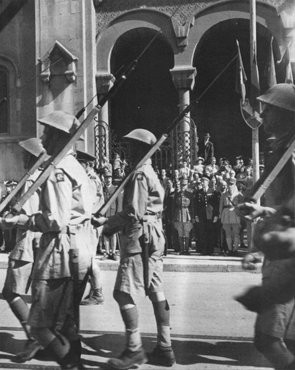Tunisia Campaign
The Tunisian campaign began with an Allied amphibious landing near Sfax in eastern Tunisia on January 5, 1943, and an attack on German positions at Gafsa in west central Tunisia on March 17, 1943. On February 4, 1943, the British Eighth Army crossed the border from Libya into Tunisia.
Squeezed between US and British Commonwealth forces and cut off from his supply bases, German General Erwin Rommel attempted to stall the Allies with defensive operations. German and Italian troops managed to rout the US Second Corps at the Kasserine Pass on February 18, but the Axis forces were vastly outnumbered and outgunned. The Allies made slow but steady progress in forcing the Axis troops into a pocket along the north central Tunisian coast.

On May 7, 1943, the British 7th Armored Division captured Tunis, the capital of Tunisia, and the US II Army Corps captured Bizerte, the last remaining port in Axis hands. Six days later, on May 13, 1943, the Axis forces in North Africa, having sustained 40,000 casualties in Tunisia alone, surrendered; 267,000 German and Italian soldiers became prisoners of war.
During the entire North African campaign, the Germans and Italians suffered 620,000 casualties, while the British Commonwealth lost 220,000 men. American casualties in Tunisia alone totaled more than 18,500. The Allied victory in North Africa destroyed or neutralized nearly 900,000 German and Italian troops, opened a second front against the Axis, permitted the invasion of Sicily and the Italian mainland in the summer of 1943, and removed the Axis threat to the oilfields of the Middle East and to British supply lines to Asia and Africa. It was critically important to the course of World War II.
Critical Thinking Questions
- What was the relationship between German expansion and the fate of Jews in North Africa?
- Explore recent scholarship about the geographic extent of the Holocaust.
- Learn about the diverse Jewish communities of North Africa before World War II.

